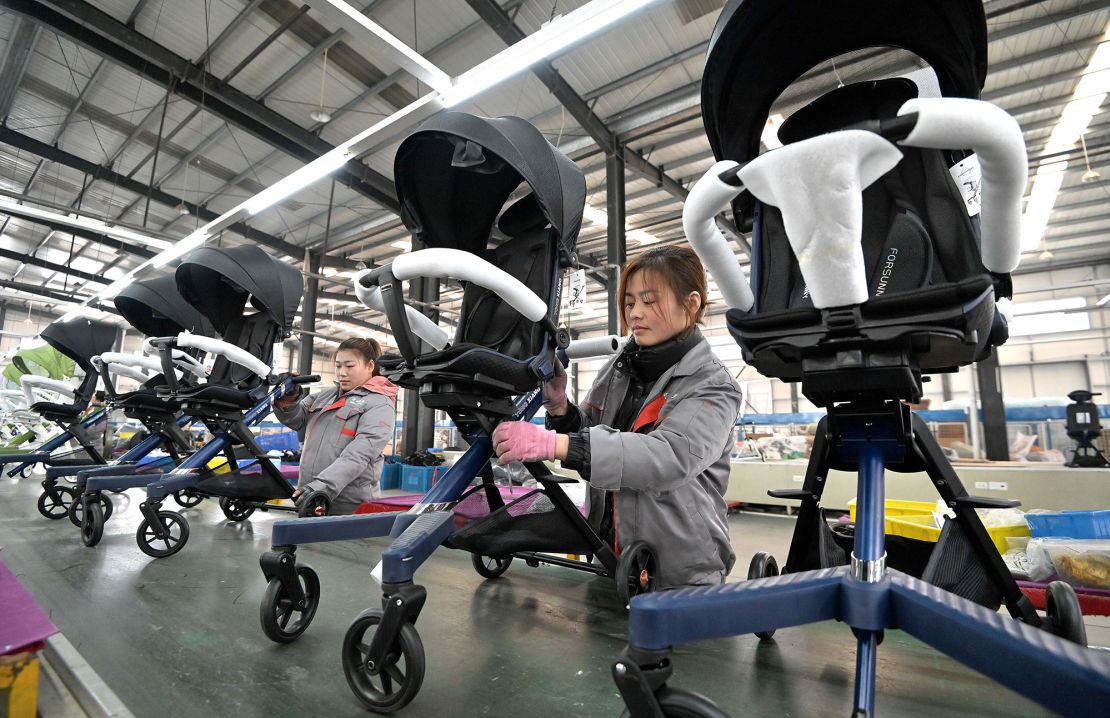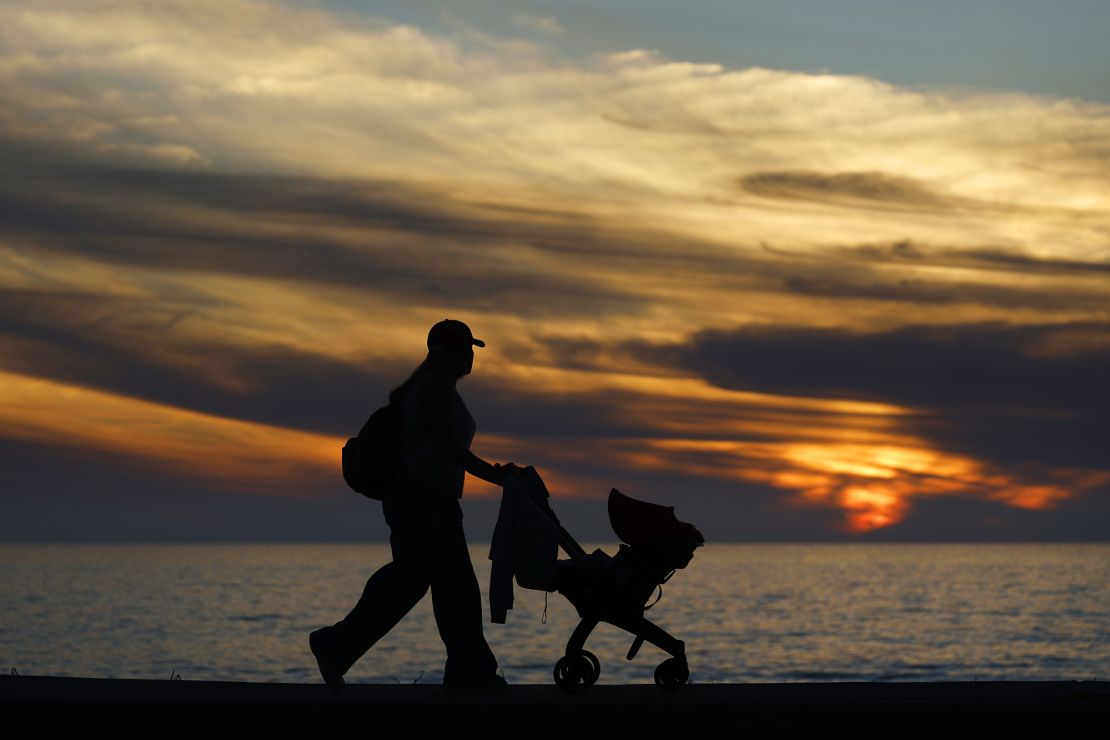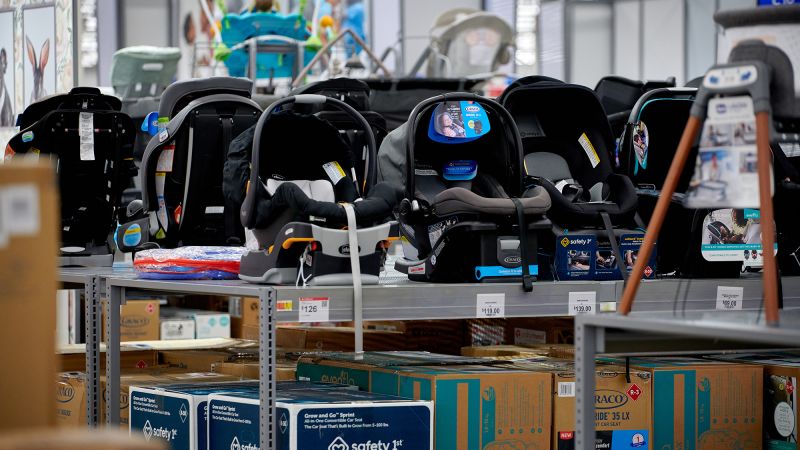New York
CNN
—
When soon-to-be moms and dads go to Modern Natural Baby, a baby and children’s gear and toy store outside of Detroit, they are typically looking for advice — the right brand of stroller, whether to buy a rocker or a glider for the nursery, or for help installing a car seat.
But recently, expectant parents arrive with a much different anxiety. They want to know how much President Donald Trump’s tariffs will raise stroller prices or if supply chain chaos will cause car seats to go out of stock.
“This has become the top concern among many of our customers,” store owners John and Emily Murray told CNN. “They are asking questions like, ‘How much will that stroller increase in price? When will the price go up? Will this stroller be out of stock if I wait to add it to my registry?’”
Nearly everything expectant and new parents need is exposed to Trump’s tariffs. Trump has slapped 145% tariffs on imports from China and a 10% minimum tax on all other countries. Some 90% of children’s and baby gear products are manufactured exclusively in China and can’t be produced in the United States or other countries anytime soon, say baby supply retailers and trade policy experts.
Tariffs have already raised prices of the leading brands of strollers, car seats and other kids’ products by hundreds of dollars, sending retailers and manufacturers scrambling to secure inventory from vendors and driving jittery parents into buying items for newborns right away.
“Due to this uncertainty, many are choosing to purchase these products themselves instead of putting them on their registries,” the Murrays said.
The Murrays have noticed friends and family members becoming aware of expectant parents’ stress over the impact of tariffs. Many are giving gift cards and cash early, well before baby showers, or groups of friends are pooling money to buy some of the more expensive items.
“It’s an unfortunate situation, but they don’t want to risk items being out of stock.”
Ninety-nine percent of imported child safety seats come from China, along with 93% of strollers, 96% of metal toddler beds and 93% of shoes for infants, according to Jason Miller, a professor of supply chain management at Michigan State University.
Nearly 80% of all toys sold in America are also manufactured in China, according to the Toy Association, a leading industry group.
Production of many baby products like strollers and car seats is labor intensive, leading to production moving to lower-wage countries like China, he said.
“You have a recipe for a category of goods where China’s lower-cost manufacturing footprint became very attractive,” Miller said. “The ecosystem to build such goods was developed over time, which makes shifting production out of China more challenging.”
It already costs about $20,000 for new parents to care for their newborn during the first year, including nearly $1,000 on baby safety gear, according to an estimate from BabyCenter, an online parenting resource. Tariffs will only add to the steep costs raising a child, an issue Trump has said he wants to address, even backing a $5,000 “baby bonus” for new moms.

“Tariffs are going to affect growing families,” said Natalie Gordon, the CEO of Babylist, an online baby registry. “We’re encouraging our customers to make purchases now knowing prices are going up.”
Stroller prices are increasing 25% on average, while infant car seats are seeing average increases of around 20%, according to Babylist.
Babylist took out a full-page ad in the Washington Post last week calling for a reprieve from tariffs on essential baby products. “Babies deserve love — not tariffs,” the ad said, likening tariffs to a “baby tax.” A dozen leading baby goods’ companies signed the advertisement, including UPPAbaby, Ergobaby and Nanit.
More than 40 Democrats in Congress have also called on the Trump administration to exempt baby safety products from tariffs as the first Trump administration did in 2018.
UPPAbaby, which sells $400 car seats and a range of strollers for up to $900, will raise prices on most items because of Trump’s tariffs, the company told customers. UPPAbaby’s strollers are manufactured in China.
“While we’ve made every effort behind the scenes to absorb as much of the cost as possible, some price increases are unfortunately unavoidable,” UPPAbaby said. “This was a tough decision, made only after exhausting every other option.”
Online baby gear company Colugo will raise prices on its $225 strollers made in China once the company sells through its current inventory, brand owner Melissa Gad told CNN.
“We don’t have the margin for these tariffs,” she said. “There’s no room.”
The impact of tariffs was “not on the radar” when Kelly Riddell decided to have a baby last year.
But Riddell, who is 34 weeks pregnant with her first child in Kentucky, hopped into action after seeing an article at 2 a.m. last week that said prices will go up on baby goods.
Right away, she bought an infant car seat and stroller set for $300 and a convertible car seat for $200. She had been planning on waiting for a deal on the stroller and adding the car seat to her gift registry.
“We went ahead and bought the one he’ll use for years because I don’t know what the economy will be like,” Riddell said. “I’m worried if I don’t act quickly I’ll end up paying a lot more.”
Rising costs for baby goods are also adding financial anxiety for Mary Goodrow, a South Carolina resident who is planning to begin trying to have a child with her husband in the next couple of months.

“We’re already worried about medical bills. We’re already having to pay more for groceries,” she said.
Goodrow, who lives in South Carolina, asked for advice on the Reddit group “BabyBumps” for pregnant women about whether to buy a stroller and car seat now or wait until a child arrives. Other members of the group responded, telling her to wait until she’s pregnant. The 500,000-member group has dozens of similar posts with questions about the impact of tariffs.
Because of the cost increases, Goodrow plans to get a stroller passed on from friends or family instead of buying one with her husband.
“We’re in our mid 30s. I’m feeling pushed to have a kid already,” she said. “Tariffs are another thing trying to put a roadblock in my way.”



